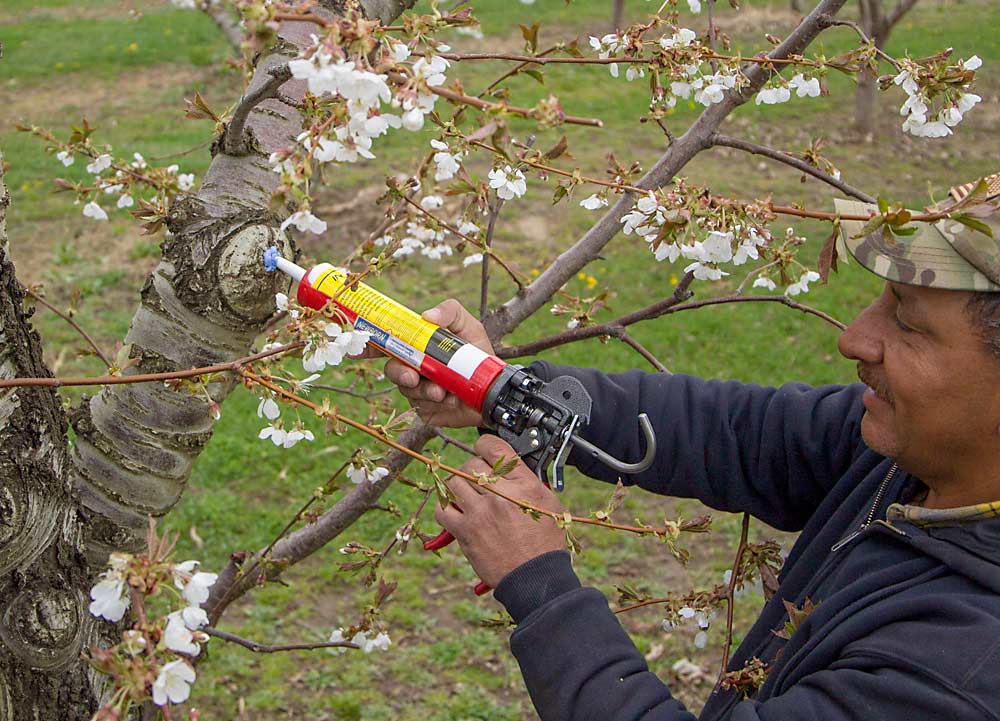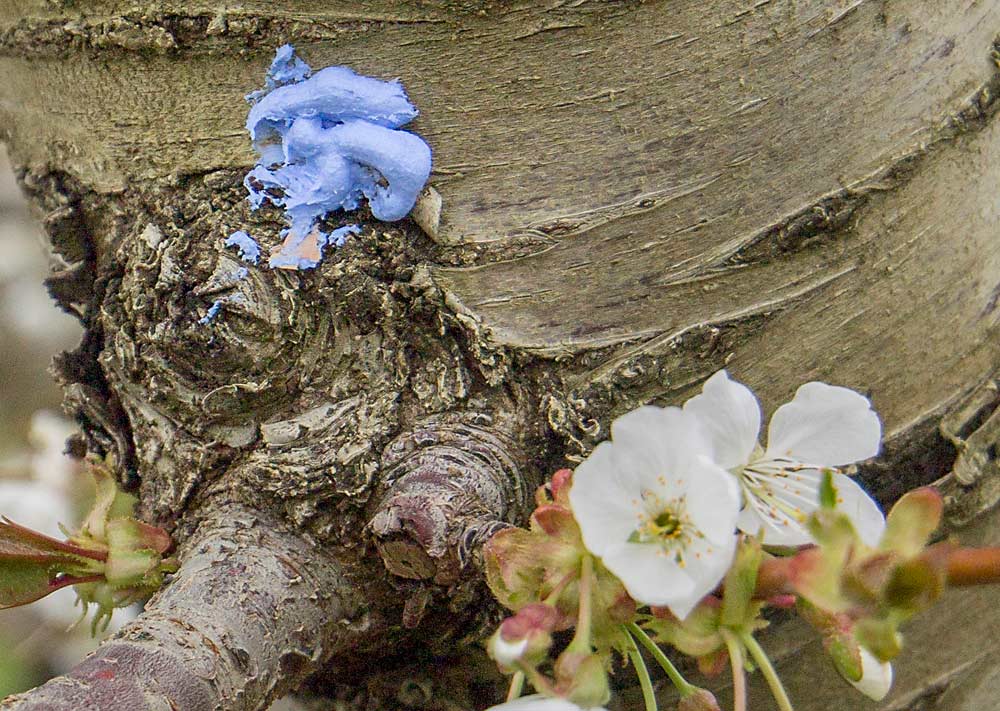
Jose Gutierrez applies Pollinate Pro, a bee-attractant paste, to a Bing cherry block at Johnson Orchards in Yakima, Washington, in April last year. The Yakima company has convinced a handful of growers in the Northwest U.S. and Mexico to try the floral-scented goop. (Kate Prengaman/Good Fruit Grower)
Think of it as perfume from a caulking gun. Very strong perfume.
“It’s like putting 1,000 flowers at one spot,” said Chris Nobbs, one of the owners of Pollinate Pro, a Yakima, Washington, start-up that sells a pollinator attractant paste to orchardists.
Nobbs and his partner, Shawn Hazen, who began working on the product about eight years ago, so far have enticed growers up and down the West Coast to try the blue-colored, flowery-smelling paste.
Eric Johnson, owner of Johnson Orchards in Yakima, has used it two years with varying results.
In 2016, the direct-market grower really noticed the difference. His blocks of Bing, Rainier and Van cherries treated with the substance seemed to set more fruit and yield a better crop than his untreated trees, he said.
For an extra experiment, he also applied a squirt to a single Bing tree in the middle of an otherwise untreated orchard. That one tree produced a full crop — 150 pounds of cherries. The surrounding trees crashed with less than half a crop. Some he didn’t pick at all.
That year, Bings all over the state suffered from poor fruit set.
“Every bee must have been hitting that tree for some reason,” he said.
Johnson skipped 2017, but tried it again last year; however pollination weather was all but perfect, so his results were inconclusive.
He’s not the only one testing it out.
Jim Harris of Yakima, orchard manager of his family’s farm, tried Pollinate Pro in an acre each of Chelan and Tieton cherries in their orchards near Roosevelt, Washington, overlooking the Columbia River. Pollination weather was great, so his crews couldn’t see much difference.
“It’s hard to judge on a year when you had really good pollinizing weather,” Harris said.
Harris plans to try again this year in an acre of Chelans, an early blooming variety.

The paste lasts longer than a spray, with six to eight weeks of pollinator attraction. (Kate Prengaman/Good Fruit Grower)
About the company
The inconclusive testimony neither surprises nor bothers the owners of Pollinate Pro. “Where our product really comes into play is when the weather is colder,” Hazen said.
The substances work with kairomones, similar to pheromones but between different species, that mimic the natural communication of flowers to bees. A brief Amazon search shows that sprays available on the market claim to do the same thing.
The paste makes Pollinate Pro different, the owners said. Nobbs, an entomologist by training, worked for a company that put a fluid attractant in plastic tubes that hung from trees, but that company went out of business.
He and Hazen, who has experience in marketing industrial adhesives, came up with the idea for a paste, which is cheaper and easier to make than the tubes, Hobbs said.
It also lasts longer than a spray. The owners promise their grower customers six to eight weeks of pollinator attraction, though growers sometimes claim they smell the stuff a year later.
Hazen and Nobbs work with a minority partner in France, a chemist, who helped develop the substance, which growers apply in a single droplet to any place on the trunk of a tree from 10-ounce tubes using a simple caulking gun. One tube, which retails for about $50, roughly has enough paste for the recommended 300 droplets per acre.
Bees, all kinds, like the smell, but they don’t swarm to it and ignore the flowers, Nobbs said. Once they see the blue droplet, they leave it alone and work the nearby blooms.
The owners so far have convinced growers to try it on a small scale. About 15 are using it in Washington, but they have customers scattered in Mexico, California, Oregon and British Columbia, as well. They’re also in talks with a distributor in Poland to reach Europe.
“We’re getting there,” Hazen said. “We’re not there, but we’re getting there.”
—by Ross Courtney
- For more information about Pollinate Pro, visit the company’s website at instarnaturals.com or call 213-712-5803.
Correction: The print version of this story incorrectly reported 30 total pounds of production from the Bing cherry tree to which Yakima orchardist Eric Johnson applied Pollinate Pro.






Honeybees are attracted to healthy flowers that have not been compromised by applying poisonous pesticides over the years. If the flowers are healthy and the tree is healthy you do not need to trick the bees to stop by.